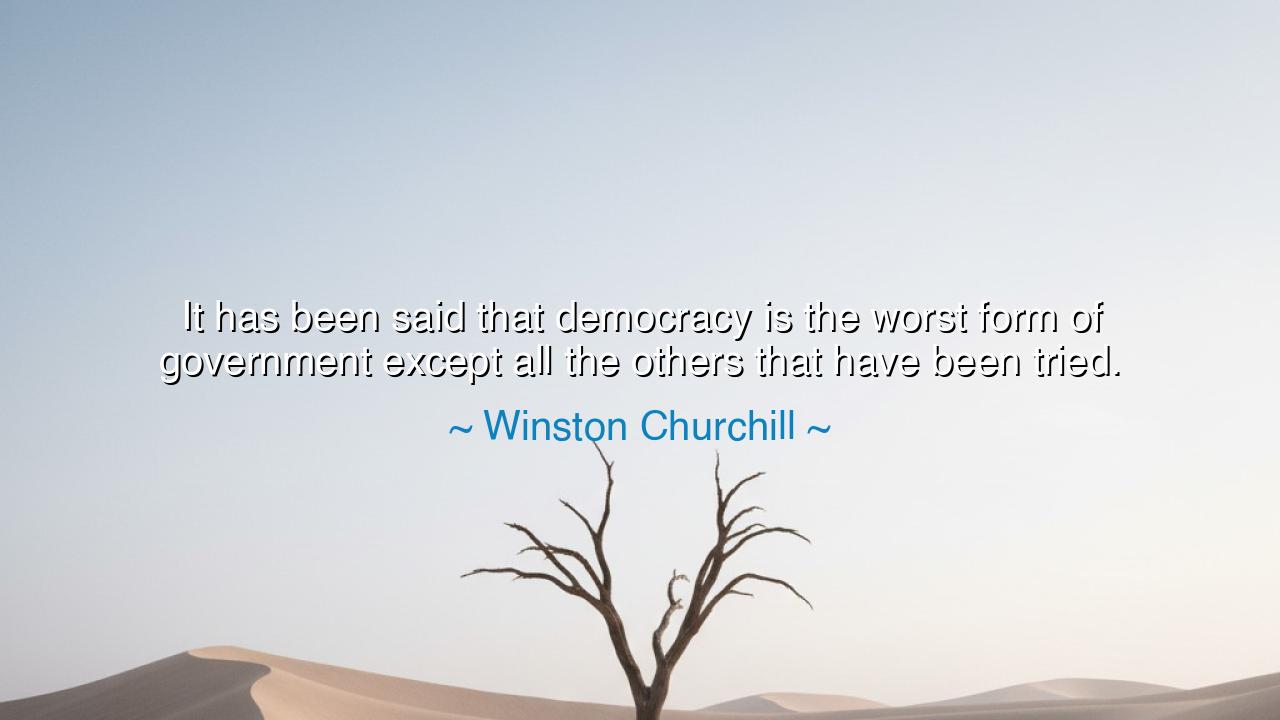
It has been said that democracy is the worst form of government
It has been said that democracy is the worst form of government except all the others that have been tried.






The words of Winston Churchill — “It has been said that democracy is the worst form of government except all the others that have been tried” — carry the weight of both humility and hard-earned wisdom. Spoken by a man who had seen the world torn apart by war, tyranny, and the madness of men who promised perfection, these words remind us that democracy, though flawed and fragile, remains humanity’s best defense against the darkness of despotism. It is not the song of the idealist, but the confession of the realist — the acknowledgment that freedom is costly, messy, and imperfect, yet still sacred beyond measure.
Churchill’s insight was forged in the fires of the twentieth century, when nations rose and fell by the will of their rulers. He saw how tyranny cloaked itself in the language of order and strength, while democracy often stumbled, divided by voices that shouted in every direction. Yet, he also saw this truth: that while dictators may silence dissent and claim efficiency, they also extinguish the very breath of the human soul. Democracy may err; it may falter and frustrate — but it allows a people to correct their own mistakes, to rise again after falling. It is the government of conscience and correction, not of fear and compulsion.
The ancients, too, understood this tension. In the city of Athens, the first democracy was born amidst conflict and imperfection. The people argued in the agora, philosophers questioned rulers, and even the wise were sometimes condemned by the unwise — as in the death of Socrates. Yet from that turbulent soil grew the roots of liberty and philosophy that still nourish the world. Athens was not perfect, but it was free — and that freedom, though costly, was greater than the peace of servitude. So it is that Churchill’s words echo the spirit of those ancient stones: better a flawed freedom than a perfect tyranny.
Churchill himself knew the agony and the grace of democracy. In the darkest days of the Second World War, when Britain stood alone against the terror of Nazi Germany, he saw that democracy’s strength lay not in unity of command but in unity of spirit. His people were not forced to fight; they chose to. They bore the bombs, the hunger, and the fear — not because they were compelled, but because they believed. That is the secret power of democracy: the courage that comes from choice, the will that arises not from obedience, but from conviction. A free people, though divided in debate, can stand unbreakable when their freedom itself is threatened.
And yet, democracy is not a gift to be taken for granted. It requires work — constant, exhausting, and unending. It demands citizens who think, who question, who shoulder the weight of their own liberty. The tyrant says, “I will think for you.” Democracy says, “You must think for yourself.” The tyrant offers easy answers; democracy offers the burden of responsibility. This, perhaps, is why so many grow weary of it. For freedom is not comfort — it is duty. It asks us to listen to voices we despise, to tolerate errors we could prevent by force, and to trust in the wisdom of the whole rather than the will of one.
In every age, there are those who lose faith in this burden. They cry for a strong leader to sweep away division, to silence the noise, to make decisions swiftly and absolutely. But Churchill’s words remind us that such longing is perilous. The peace of tyranny is the silence of the grave, while the noise of democracy is the sound of life — loud, disorderly, and filled with contradiction. A society that values freedom must embrace its imperfection, for to demand purity is to invite oppression.
So let this teaching be carried to the generations that follow: cherish democracy not because it is perfect, but because it allows perfection to be sought. Defend it not for its efficiency, but for its humanity. Participate in it, even when it disappoints you; speak, even when you feel unheard; vote, even when you doubt it matters. For the true strength of democracy lies not in its leaders, but in the hearts of its people, who refuse to surrender their voice to any master.
And when the world grows weary of argument and longs for the simplicity of command, remember Churchill’s wisdom: democracy is indeed the worst form of government — except for all the others. It is the noble struggle of a free people against the temptation of ease. It is the imperfect vessel that carries the eternal flame of human dignity. Guard it well, for once that flame is lost, no generation may ever light it again.






AAdministratorAdministrator
Welcome, honored guests. Please leave a comment, we will respond soon